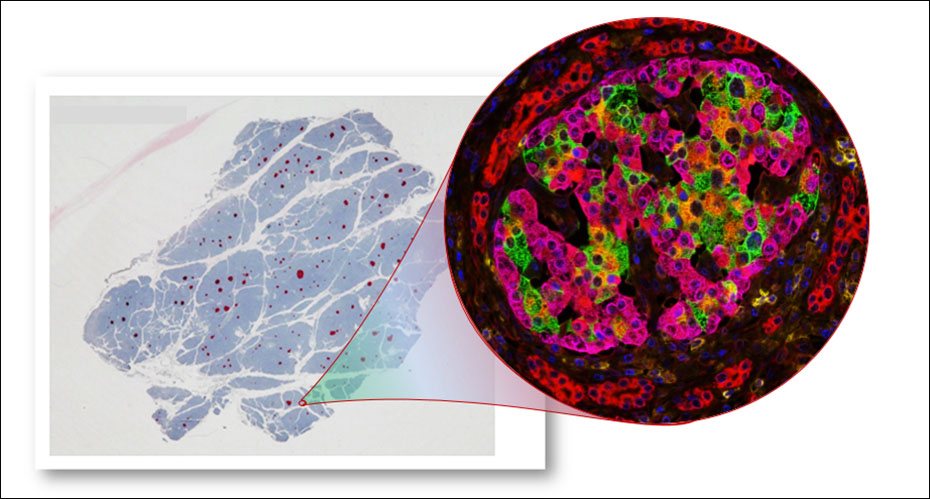Islet Biology Group
The Islet Biology Group's aim is to understand the biology of the pancreatic beta-cell in health and how this becomes dysregulated in diabetes.
The group is built on strong teamwork and collaboration and aims to make a difference in the lives of people living with, or who are at risk of, diabetes. It seeks to understand how the beta cell responds to the physiological and pathophysiological cues in its immediate environment such that therapeutic interventions can be designed to maintain beta cell health and viability.
Islet Biology is composed of people from a diversity of backgrounds across the life sciences. These include cell biologists, pharmacologists, virologists, physiologists and immunologists as well as those with data science skills. The group works extensively with clinicians in the wider Exeter diabetes team and are always eager to ensure that our research plans are of relevance to the community of people living with diabetes.
One of its most important resources is a collection of pancreas samples (known as the Exeter Archival Diabetes Biobank) which were recovered from people very soon after the diagnosis of type 1 diabetes. Many of the organs come from young children and they represent the world’s largest collection of recent-onset type 1 diabetes pancreata. As such, this biobank provides the group with a unique opportunity to investigate the immunopathology of type 1 diabetes and, when coupled with our state-of-the-art imaging and analysis facilities, allows it to gain new insights into the progress of disease.
The group also makes extensive use of tissue culture to maintain human and rodent beta-cell lines as well as having access to rodent and, most recently, zebrafish models in which to study beta-cell pathobiology. It exploits the latest molecular and cell biological approaches to address important questions arising from study of these organisms.
| Name | Role |
|---|---|
| Professor Noel Morgan | Professor of Endocrine Pharmacology, Director of Institute of Biomedical and Clinical Science |
| Associate Professor Sarah Richardson | Associate Professor in Cellular Biomedicine |
| Dr Craig Beall | Senior Lecturer |
| Dr Mark Russell | Lecturer in Islet Biology |
| Dr Chloe Rackham | Lecturer in Diabetes |
| Dr Martin Eichmann | Lecturer in Immunology |
| Dr Carol Yang | Lecturer in Cell Biology of Diabetes |
| Dr Pia Leete | Research Fellow |
| Dr Joanne Boldison, | Independent Research Fellow |
| Dr Afi Leslie | Postdoctoral Research Associate |
| Dr Rebecca Dewhurst-Trigg | Postdoctoral Research Associate |
| Rebekah Boreham | Research Assistant |
| Conor McMullan | Research Assistant |
| Dr Christine Flaxman | Research Technician |
| James Crighton | Experiemtnal Officer |
| Jessica Hill | PhD Student |
| Christiana Lekka | PhD Student |
| Katie Partridge | PhD Student |
| Abdullah Alatawi | PhD Student |
| Joss Atkins | PhD Student |
Please find a selection of the group's key and landmark papers below. Full publications lists are available on individual biographies:
Studies of insulin and proinsulin in pancreas and serum support the existence of aetiopathological endotypes of type 1 diabetes associated with age at diagnosis. Leete, P., Oram, R.A., McDonlad, T.J., Shields, B.M., Ziller, C., Hattersley, A.T., Richardson, S.J. and Morgan, N.G. 2020. Diabetologia. 63, 1258-1267.
An integrated multi-omics approach identifies the landscape of interferon-α-mediated 5 responses of human pancreatic beta cells. Colli, M.L., Ramos-Rodriguez, M., Nakayasu, E.S. Alvelos, M.I., Lopes, M., Hill, J.L.E., Turatsinze, J-V., Coomans de Brachène, A., Russell, M.A., Raurell-Vila, H., Castela, A., Juan-Mateu, J., Webb-Robertson, B.M., Krogvold, L., Dahl-Jorgensen, K., Marselli, L., Marchetti, P., Richardson, S.J., Morgan, N.G., Metz, T.O., Pasquali, L. and Eizirik, D.L. 2020. Nature Commun. 11(1):2584. doi: 10.1038/s41467-020-16327-0
HLA Class II antigen processing and presentation pathway components demonstrated by transcriptome and protein analyses of islet β-cells from donors with type 1 diabetes. Russell, M.A., Redick, S.D., Blodgett, D.M., Richardson, S.J., Leete, P., Krogvold, L., Dahl-Jørgensen, K., Bottino, R., Brissova, M., Spaeth, J.M., Babon, J.A.B., Haliyur, R., Powers, A.C., Yang, C., Kent, S.C., Derr, A.G., Kucukural, A., Garber, M.G., Morgan, N.G. and Harlan, D.M. 2019. Diabetes. 68, 988-1001.
The transcription factor, STAT6, plays a critical role in promoting β-cell viability and is depleted from the islets of individuals with type 1 diabetes. Leslie, K.A., Russell, M.A., Taniguchi, K., Richardson, S.J. and Morgan, N.G. 2019. Diabetologia 62, 87-98.
Fifty years of pancreatic islet pathology in human type 1 diabetes – insights gained and progress made. Morgan, N.G. and Richardson, S.J. 2018. Diabetologia 61, 2499-2506.
Enteroviral infections in the pathogenesis of type 1 diabetes: new insights for therapeutic intervention. Curr. Richardson, S.J. and Morgan, N.G. 2018. Opin. Pharmacol. 43, 11-19.
Islet Biology collaborates extensively with researchers worldwide and are members of the JDRF-nPOD (Network of Pancreatic Organ Donors) consortium as well as being partners in European projects (INNODIA and INNODIA-HARVEST) and other international collaborations (such as VIDIS; a group studying viral involvement in type 1 diabetes).
The Islet Biology research group uses the following research facilities and technologies:
- The Exeter Sequencing Service
- RILD Molecular Biology Resources
- NIHR Clinical Research Facility (CRF)
- High Performance Computing
More details of all of these can be found here.

